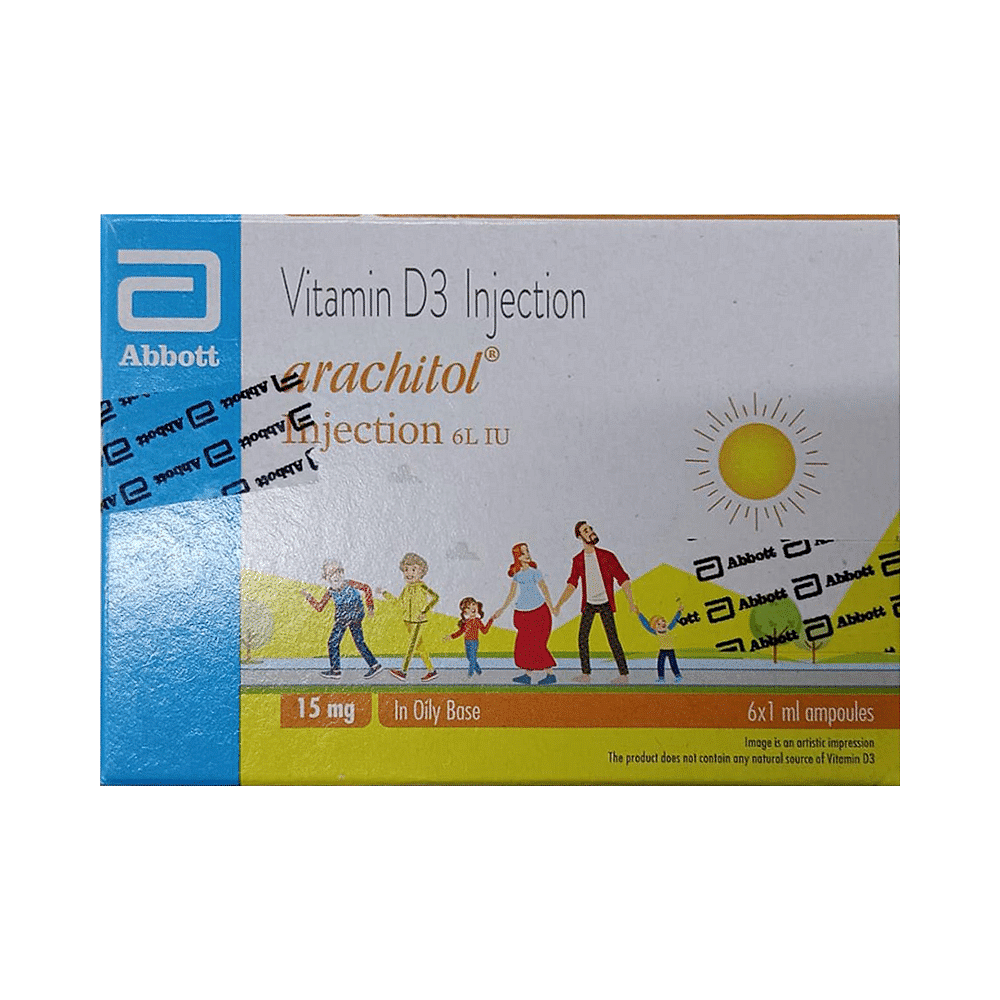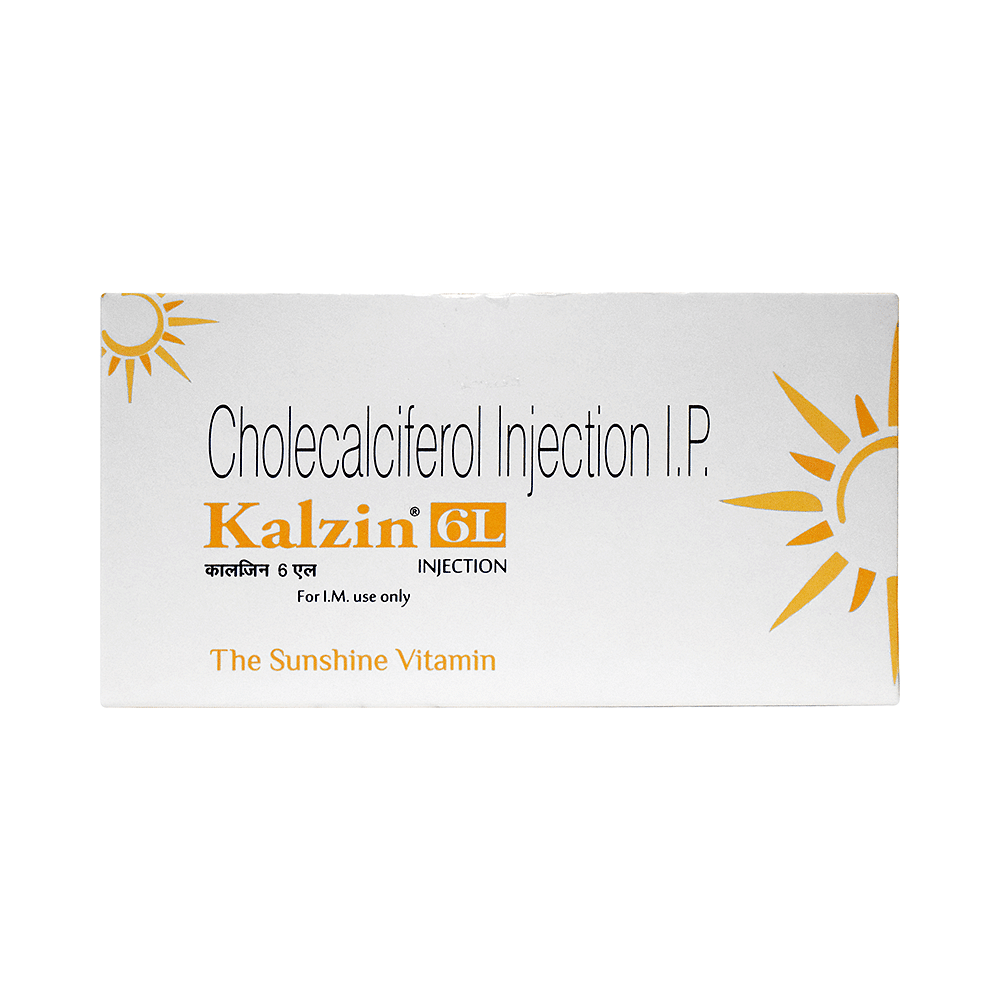
Devita 600000IU Injection
Manufacturer
Novaduo Pharma
Salt Composition
Vitamin D3 (600000IU)
Key Information
Short Description
Devita 600000IU Injection helps your body to absorb a mineral called calcium, which is important for maintaining strong bones. This medicine is used if your diet does not provide enough vitamin D and may be used to treat certain bone conditions such as thinning of the bones (osteoporosis).
Dosage Form
Injection
Introduction
Devita 600000IU Injection is given under the supervision of a healthcare professional and should not be self-administered. You should take it regularly to get the most benefit from it. If you are using it to treat osteoporosis you will be prescribed other medicines as well. This medicine may be only part of a complete program of treatment that also includes making changes to your diet and taking calcium and vitamin supplements. Learn about the foods you should eat to make sure you get enough calcium and vitamin D in your diet.
Directions for Use
Your doctor or nurse will give you this medicine. Kindly do not self administer.
How it works
Devita 600000IU Injection is a form of vitamin D. It raises vitamin D levels in your blood. This in turn raises calcium levels in your blood by helping you absorb more calcium from food.
Quick Tips
Get enough sun exposure 10-30 minutes thrice a week. Light-skinned: 20-30 minutes of sun exposure. Dark-skinned: 30-40 minutes of sun exposure. Eat vitamin D rich diet like egg yolk, mushrooms, cheese, milk, butter, fortified food and oily fish. Do not take antacids or any other medication 2 hours before or after taking Devita 600000IU Injection. Other prescription or over-the-counter medicines, vitamins and herbal products may affect the Devita 600000IU Injection levels in the body. Tell your doctor about all your current medicines and any medicine you start or stop using.
Related Medicines

Ecodol 6 Injection

Nova D3 Injection

Arachitol 6L Injection

Kalzin 6L Injection

Cliff D3 600000IU Injection

Diafast 6 Injection
Frequently asked questions
What are the benefits of taking Devita 600000IU Injection?
Devita 600000IU Injection is used to support bone health, immune system function, brain and nervous system health. It can help regulate insulin levels and promote heart and blood vessel health.
Is it better to take Devita 600000IU Injection at night or in the morning?
You can take Devita 600000IU Injection at any time of day. It's best to consult your doctor regarding optimal timing for individual needs and always follow their advice.
How is Devita 600000IU Injection administered?
Devita 600000IU Injection should be administered only under the direct supervision of a qualified healthcare professional or your doctor. Do not attempt self-administration. The dosage will depend on your individual medical condition and will be determined by your doctor based on their assessment.
Who should not take Devita 600000IU Injection?
Devita 600000IU Injection is not recommended for individuals with known allergies to cholecalciferol, patients who have high levels of calcium in the blood or evidence of calcium in their urine. Additionally, those with pre-existing kidney stones and severe kidney dysfunction should avoid this medication. Consulting your doctor before starting any new treatment is crucial.
What happens if I take too much Devita 600000IU Injection?
Taking excessive amounts of Devita 600000IU Injection over prolonged periods may increase calcium levels in the blood (hypercalcemia). This can lead to symptoms such as weakness, fatigue, vomiting, diarrhea, sluggishness, kidney stones, increased blood pressure, and growth retardation in children. If these symptoms occur, consult your doctor immediately.
What is the recommended daily intake of Vitamin D3?
Devita 600000IU Injection contains vitamin D, a vital nutrient used as a supplement for patients with Vitamin D deficiency. Typically, your daily Vitamin D requirement is around 4000 IU/day. If your diet cannot meet this requirement, supplementation may be necessary, ranging from 1000 to 3000 IU/day.
What happens if Vitamin D3 levels are low?
Low Vitamin D3 levels can lead to rickets in children and osteomalacia in adults. Additionally, Vitamin D deficiency has been linked to an increased risk of conditions like diabetes mellitus type 1, high blood pressure, depression, certain types of cancer, and osteoporosis.


